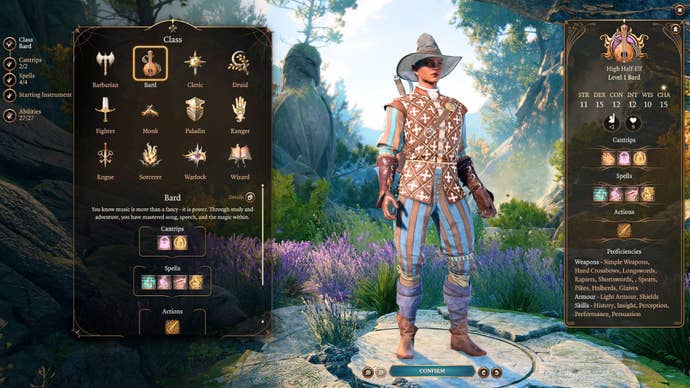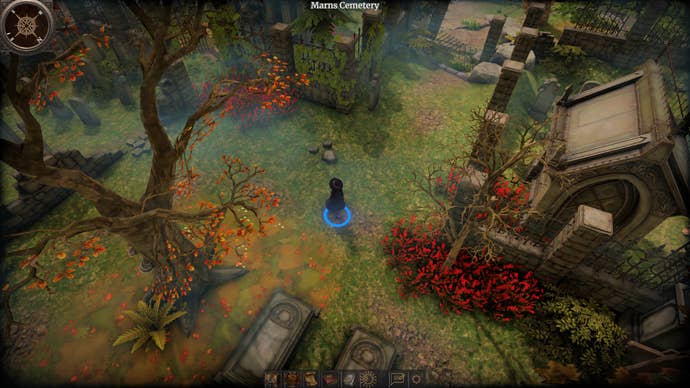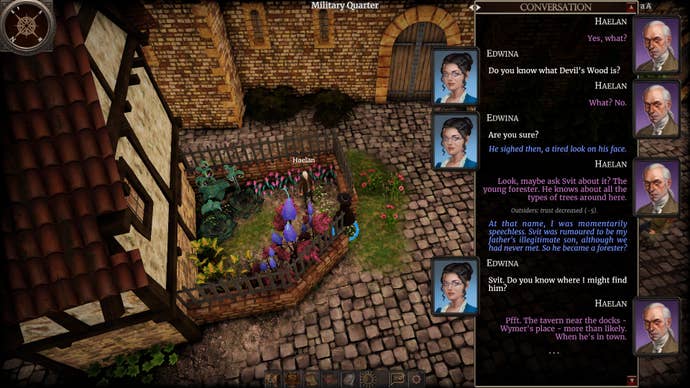We have all known the profound sorrow of getting two hours into an RPG and deciding that actually, Mum, I don’t want to be an elven druid anymore. Being an elven druid sucks ass. There’s barely any plantlife in the opening dungeon, so half my support skills are useless, and the only animal companion I’m qualified to conjure right now is a cranky squirrel. I’d much rather be a rogue. Look at all these elevated paths and pickable locks hereabouts! Look at all these shadows I could be skulking in, these precarious chandeliers directly opposite crawlspaces with rusty grills! Ugh, if only I weren’t a stupid diluted floral wizard!
You whine and kick your heels and finally reroll your character as a debonair sneak with a brace of poison daggers. Then, three hours later, you realise that the current quest is set exclusively in meadows, under blazing sunshine, against squadrons of spiders with a 330-degree viewing arc, and conclude that being a rogue is rubbish as well.
Obviously, if you have a group of characters you can enjoy all the options, but for me, this creates a bizarre problem of envy. Hark at Johnny the Battlemage there, carrying the brawl once again with his bespoke swordmagic while I, the mud-faced squirrel conjurer, hobble around in the rearguard casting Minor Verdancy. Screw you, Johnny the Battlemage. I’m going to restart the game and steal your best moves and then murder you before you’ve even joined the party.

A contrarian might level up these routine earlygame complaints into the argument that the breadth of class options offered by a traditional roleplayer can be to its disadvantage. If there are 12 classes in an RPG, such a contrarian might snicker, you’re going to spend 11 of every 12 hours wallowing in regret.
There are questions of execution too, of course. For every RPG that has the wit or resource to sustain a bunch of intriguing or even ’emergent’, class-specific solutions for every scenario, there are a bunch that overlap and genericise approaches, cramming them into each area in a dutiful way. I associate this particularly with The Outer Worlds, in which the different questing methods are deflatingly easy to map out the second you enter the area. Unearthing solutions feels more like scooping up collectibles, at times, than role-playing.
All of the above is broadly why I’m still enjoying The Necromancer’s Tale, after gushing over the character creator a week or two back. As the name implies, it’s a one-job RPG in the tradition of The Bard’s Tale, though I think it commits to the idea far more than the latter.
You are a necromancer operating out of a big mansion in a fictional town near Venice, during the age of Isaac Newton. There are, admittedly, shades (hoho) and degrees of necromancy, based on your starting stats. You might be a burly necromancer who works down the docks, or a spindly bookworm who teaches at the academy, or a crypt-delving Sherlock, or a mystic boozehound who can talk the hind leg off a cadaver. But your fundamental purpose in this crafty little period piece is to get really good at raising the dead.

You don’t start off with this goal, mind. You start off investigating the untimely death of your dad. But then it turns out your dad dabbled in the dark arts and had various powerful rivals. So you sift through his notes and learn a few curses to protect yourself and your frail mother, and then you learn a few more spells because this liche lore is pretty handy, and you slowly become part of the underworld.
The chapters often hinge on mastering a particular rite, which might involve tracking down a cipher for your dad’s brain-boggling spellbook, then gathering ingredients such as grave soil and deadly nightshade. In the process, you’ll need to interact with folks in town, asking for hints about certain mushrooms, or where such-and-such a cursed tree is rumoured to grow. You have to do this, of course, without exposing yourself. The populace are grouped into factions, such as Children or Gentry, with Trust levels that add up into an overall likelihood of being chased down and butchered by a torch-waving mob.
Within all that, you’re also deciding whether to be nasty or nice to the various individual people in your orbit, who range from childhood friends to colleagues and woebegone randos in the slums. Will you test this new potion on yourself, or an animal, or some feckless sod down the pub? From where, exactly, will you obtain the body parts you need for this particular seance?
It thickens and it thickens. The writing, which I’ve praised already, does a quietly excellent job of fleshing out a town’s worth of soldiers and shopkeepers, alchemists and priests, oafs and busybodies. It has enough flair that you can forgive the world itself for being a bunch of lifeless painted boxes and forests full of invisible walls, made interminable by a lack of fast travel options. The branching dialogue conundrums are witty enough that you can forgive the combat for being flavourless hex-and-turn-based fare.

But above all, what gives The Necromancer’s Tale life is simply that it’s dedicated to necromancy. It steams away the FOMO incumbent on fullscale character creation, and allows both the developers and player to sink their fangs into the role. It makes a dramatic asset of the disadvantages of being a gibbet-diver. Again, you have to be secretive. You can’t just pop by the tavern and say “Lads I’ve just found a phat tomb, who’s up for a shovelling?”
There’s no spectral regret associated with these constraints, however: you aren’t thinking “beggars and bellwhistles, I knew I should have picked Fighter”. You’re thinking: “Patience, Aleister. Weave the net. Climb the ladder.” I haven’t experienced any of that weird jealousy towards other party members with their own flashy skillsets, either. Partly this is because a lot of the game’s party members are dead, but also, I’m not supposed to carry the fray. My job is to scheme in the shadows.
I’d dearly like to play more fantasy games that drill into other familiar RPG classes, weaving stories and scenarios around their drawbacks. For example – and I think I’ve touched on this in other pieces – an RPG dedicated to the clerical professions, in which you are either a pacifist or not able to hold your own for long in combat.
I suggested something like this to Larian’s boss Swen Vincke once, back at Digital Dragons in 2024. I asked him if they’d consider making smaller, more specialised RPGs, after topping the pile with Baldur’s Gate 3, and he looked at me like I’d asked him to chainsaw his favourite dog and give all the pieces names. I suspect many of you will be of the same mind. You’re all fools and blaggards, as far as I’m concerned. Gimme a Healer’s Tale next, Psychic Software.






![Shining Resonance Refrain [VOICES38] – MaxBit Shining Resonance Refrain [VOICES38] – MaxBit](https://i2.wp.com/gamepcfull.com/wp-content/uploads/2025/10/Free-download-shining-resonance-refrain-gamepcfull.jpg?w=100&resize=100,100&ssl=1)
